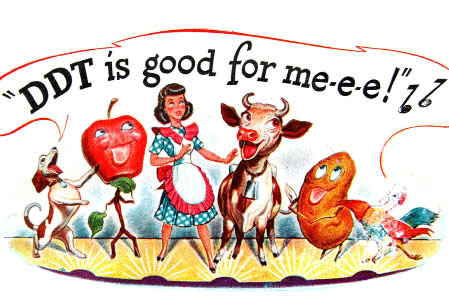In the fall of 1962, a group of chemical companies including Monsanto – at the time the largest producer of the cancer-causing chemical compound, PCB – launched a full-throttle public relations campaign against Silent Spring and its author, biologist Rachel Carson.
In Silent Spring, Carson dared to take on the world’s biggest chemical companies, explaining that their products were not only harmful to birds and bees, but to humans, too. In the wake of its publication, the chemical industry PR machine kicked into gear. “Hundreds of thousands of dollars were spent attempting to discredit not only the book but the ‘hysterical’ woman who wrote it,” says Kaiulani Lee, the playwright and actor who wrote and performs the definitive play about Carson, A Sense of Wonder.
 photo Crossett Library, Penn Salt chemicals, Time magazine
photo Crossett Library, Penn Salt chemicals, Time magazine
In addition to paying spokespeople to tarnish Carson’s reputation, Monsanto also sent a parody to newspapers around the country. In “The Desolate Year,” Monsanto painted a frightening picture of a world without chemicals. It was a bleak place. “Genus by genus, species by species, sub-species by innumerable sub-species, the insects emerged,” the article warned. “Creeping and flying and crawling. … They were chewers, and piercer-suckers, spongers, siphoners and chewer-lappers, and all their vast progeny were chewers – rasping, sawing biting maggots and worms and caterpillars.” It goes on and on like this for five pages. (As we now know, that diatribe was fear-mongering, not fact-marshalling. Organic and low-chemical farmers across the United States are proving that you can eliminate, or greatly reduce, toxic chemical use on the farm without having to worry about being overrun by pests, weeds, or diseases.)
I can’t help but notice that in its recent PR missives against anti-GMO activists, Monsanto, which is today the world’s largest manufacturer of genetically modified seeds, is using the same fear tactics. Only this time, it’s stirring up fear of a world without biotech crops.
In a recent debate on NPR, Monsanto’s Chief Technology Officer, Robert Fraley, sounded remarkably like “The Desolate Year.” “What I’d like to do is [describe] what it would be like to live in a world without GMO crops,” Fraley said in his closing statement. “Without GMOs, farmers would need to dramatically increase their use of herbicides and insecticides. [T]he pressure … will drain more wetlands, will cut down more forests. We [will] have to take tractors and run up and down the fields … and release more greenhouse gas emissions. Banning GMO crops is equivalent to putting 26 million new cars on the road. … I hope, for the sake of all the people … that you vote to … support GM food.”
Despite Fraley’s dire warnings, feeding the future doesn’t depend on GMOs. In fact, the spread of GMOs is actively undermining our ability to feed future generations by locking farmers into dependence on expensive seeds and inputs, by undermining soil health, by reducing biodiversity, and more.
Keep in mind that the main GM traits that have been commercialized convey just two qualities, or a combination of them: pest- and weed-resistance. Industry promises for big nutrition or yield improvements have not borne fruit. Studies show that non-GM corn and soybean yields in Europe, for example, are similar to the yields achieved with GMOs here in the US.
What’s more, we know that the ecologists who warned that GMOs would spur weed and pest resistance were right. As Jonathan Foley, the head of the California Academy of Scientists, has said: “You can’t put out a weed-resistant crop and expect the weeds to sit still. They will evolve.” They will, and they have. Today, we have Roundup-resistant weeds, some with stalks so thick that they can damage farm equipment. And we have Bt-resistant bugs so defiant they’ve got corn growers in our Midwest worried. “Every ecologist predicted that,” Foley says.
As with the chemicals Carson raised the alarm about, when it comes to genetic engineering, the risks are too great, the rewards too minimal, the alternatives too ample to do anything but to stand up to this latest wave of industry fear-mongering.
We don’t have a paywall because, as a nonprofit publication, our mission is to inform, educate and inspire action to protect our living world. Which is why we rely on readers like you for support. If you believe in the work we do, please consider making a tax-deductible year-end donation to our Green Journalism Fund.
DonateGet four issues of the magazine at the discounted rate of $20.